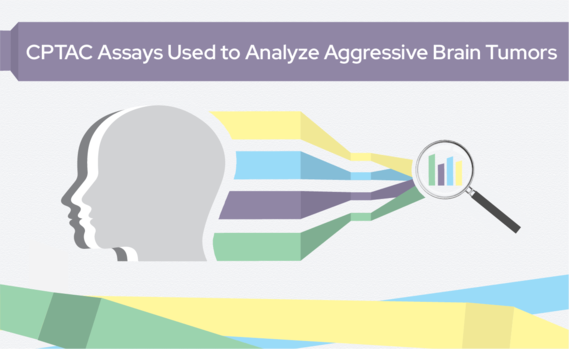Diffuse intrinsic pontine gliomas (DIPG) are a type of brain tumor that is extremely aggressive and have a historically poor prognosis. To improve these outcomes, the development of novel therapies and methods to measure their efficacy are critical.
Recently, a team of CPTAC researchers from the Fred Hutchinson Cancer Center contributed to a first-in-human trial (titled BrainChild-03) administering repeated locoregional B7-H3 CAR T cells to children with recurrent/refractory CNS tumors and DIPG (published in Cancer Cell). The Fred Hutch Team, led by Drs. Amanda Paulovich and Jeff Whiteaker, provided correlative studies using immunoaffinity enrichment coupled with multiple reaction monitoring-mass spectrometry (immuno-MRM-MS) to quantify immunomodulatory proteins in serial CSF and serum biospecimens in their CLIA environment. The multiplex assays were developed under both the CPTAC program and the Beau Biden National Cancer Moonshot’s APOLLO network.
 The results highlight the present and future utility of targeted proteomics as a tool for correlative studies in clinical trials. Moreover, their contribution directly bolsters the reported efficacy of repeated intracranial B7-H3 CAR T-cell dosing in children with DIPG by providing evidence of modulation in B7-H3 and critical immune analytes. When asked about the significance of these findings, Dr Paulovich shared that, "The results from the BrainChild-03 trial reveal the tremendous potential of immuno-MRM in unraveling both the immune and tumor responses in immunotherapy clinical trials. This advanced technique, capable of measuring key immunomodulatory proteins in tissues and biofluids, provides a deeper understanding of the complexities of cancer immunotherapy, paving the way for more precise and effective immune-based therapies in the future.”
The results highlight the present and future utility of targeted proteomics as a tool for correlative studies in clinical trials. Moreover, their contribution directly bolsters the reported efficacy of repeated intracranial B7-H3 CAR T-cell dosing in children with DIPG by providing evidence of modulation in B7-H3 and critical immune analytes. When asked about the significance of these findings, Dr Paulovich shared that, "The results from the BrainChild-03 trial reveal the tremendous potential of immuno-MRM in unraveling both the immune and tumor responses in immunotherapy clinical trials. This advanced technique, capable of measuring key immunomodulatory proteins in tissues and biofluids, provides a deeper understanding of the complexities of cancer immunotherapy, paving the way for more precise and effective immune-based therapies in the future.”
B7-H3 is an immunoregulatory member of the B7 protein family that is expressed on the surface of DIPG tumors. The BrainChild-03 team, led by Dr. Nicholas Vitanza, set out to create B7-H3-specific CAR T cells and launch a phase I clinical trial of locoregional B7-H3 CARs. The open, ongoing, phase I, single-institution clinical trial has three distinct arms, A: patients with localized recurrent/refractory CNS tumors; B: patients with metastatic recurrent/refractory CNS tumors, and C: patients with DIPG enrolled at any time following standard radiotherapy (including patients with disease progression and/or metastatic disease. This publication focuses on arm C, which contained three evaluable patients who received weekly fixed doses of 1 × 107 B7-H3 CARs numbering between 10 and 18 doses. The researchers noted that no patients experienced dose-limiting toxicities and, for two patients in particular, extended survival post-initial CAR T-cell infusion appears promising given their clinical and radiographic progressive status.
The CPTAC researchers applied their multiplex, immuno-MRM assay panels to quantify immunomodulatory proteins in longitudinal biospecimens from two of three evaluable BrainChild-03 DIPG patients. These immuno-MRM assays enabled sensitive measurements of proteins in serum and CSF; the team detected a total of 78 proteins (50 CSF, 59 serum) above the lower limit of quantification. The researchers found that there were far fewer protein fluctuations in serum compared to CSF samples and successfully verified local immune activation in the CNS. Notably, analyses of both patients revealed a steady decline in serum B7-H3 over the course of treatment. Despite differences in progression status and overall treatment response, the two patients showed marked similarities including markers of macrophage maturation and proteins involved in immune cell recruitment, including CD14, CD163, CD44, CSF-1, CXCL13, and VCAM-1. Regarding this effort and next steps, Dr Whiteaker added that, “It’s exciting to see the successful application of multiplexed immuno-MRM in the BrainChild-03 study. In future work, we hope to apply a growing catalog of validated MRM assays and incorporate advancements in improving assay sensitivity and throughput.”

